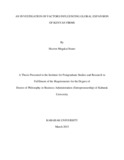AN INVESTIGATION OF FACTORS INFLUENCING GLOBAL EXPANSION OF KENYAN FIRMS
Abstract
The purpose of this research was to investigate the factors influencing global expansion performance of Kenyan firms. Kenyan firms must ultimately possess the capability to innovate and interact effectively with other firms in more or less tightly connected networks of shared production and innovation, critical capabilities in the current wave of globalisation. The research study used descriptive and inferential design as a chosen design. The researcher used factor analysis and multiple/multivariate regression analysis to determine the functional relationship between independent variables (factors) and the dependent variable. The independent variables were: innovation & technology, fitness of management, global marketing strategy; and support environment and the dependent variable, global performance. A random sample of 205 firms was drawn out of 440 members of Kenya Association of Manufacturers, based in Nairobi, from Kenya Association of Manufacturers and Exporters Directory of 2012. The senior management of the selected firms were surveyed and 175 firms responded. The key findings from the research are that: there is functional relationship between global market strategy and global expansion; there is a functional relationship between firms’ intensity in innovation and technology and global expansion, there is no functional relationship between supportive environment for Kenyan firms and their global expansion; and there is no functional relationship between fitness and global expansion. The implications for practice is that the ranking of the factors in order of priority supports focusing concern on the orientation of business strategy toward global market strategy, market research geared at obtaining foreign market intelligence, innovation and technology, product adaptation, service orientation, collaborative ventures, and long-range vision as key factors in making Kenyan firms successful in the international market. The implication for policy is that there is need for collaboration between industry and government in pursuing policies for global expansion and among SMEs and large enterprises particularly in areas of rapid technological change. The Kenyan government should put in place mechanism to fund research in her universities that is geared at giving the country some technological leads and to commercialize the research outputs. In addition it would create an arm that gathers information of research outputs/ideas in the rest of the world universities. It is further recommended that an early-warning system to alert firms of changes that may lead to potential failure in their global business activities be developed. Also the Kenyan government should have more bilateral agreements and lobbying of WTO to ensure fair play - in this regard, develop trade negotiations capabilities within government, co-opt leading trade lawyers into trade delegations.

